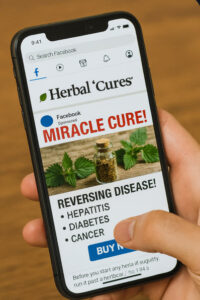The Hidden Dangers of Facebook’s “Miracle” Herbal Cures
The Hidden Dangers of Facebook’s “Miracle” Herbal Cures — And Why Your Doctor (and a Trusted Herbalist) Should Always Be in the Loop

Image by Kathy McCabe and Copilot
In the age of social media, health advice is only a scroll away. Facebook groups, ads, and posts often promote herbal “cures” that promise to reverse chronic illnesses, detox your body, or heal you completely — all without side effects. While some herbal remedies have legitimate uses, taking every claim at face value can be risky, even dangerous.
Why Facebook Herbal “Cures” Can Be Harmful
- False or Exaggerated Claims
Many posts promote one product as a cure‑all for multiple unrelated diseases — from hepatitis to diabetes to cancer — without scientific evidence. No single herb can treat such a wide range of conditions, and claims like these are a hallmark of health misinformation. - Lack of Regulation and Testing
Unlike prescription drugs, most herbal products are sold as dietary supplements and are not required to prove safety or effectiveness before hitting the market. This means:
- No guarantee of correct dosage
- Possible contamination with heavy metals or undeclared drugs
- Mislabeling of ingredients
- Dangerous Interactions
Herbs can act like medicines in the body — and that means they can interact with prescription drugs. For example:
- St. John’s Wort can reduce the effectiveness of antidepressants, birth control, and blood thinners
- Ginseng can affect blood sugar control in diabetics
- Garlic supplements can increase bleeding risk when combined with anticoagulants
- Delayed Proper Treatment
Relying solely on unproven remedies can delay diagnosis or effective treatment for serious conditions, worsening outcomes. - Targeting Vulnerable Audiences
Investigations have found Facebook ads for illegal or unsafe supplements targeting people with chronic illnesses — exploiting their hope for a quick fix.
Why You Should Always Tell Your Doctor
Even if you trust a remedy, your healthcare provider needs to know what you’re taking. Here’s why:
- Safety Checks: Identify harmful interactions with your medications or conditions.
- Accurate Diagnosis: Symptoms could be side effects of an herb, not your illness.
- Evidence‑Based Guidance: Helps you choose remedies with proven benefits.
- Coordinated Care: Ensures that all treatments — herbal or conventional — work together, not against each other.
The Role of a Qualified Herbalist
A reputable herbalist can be an invaluable ally in your wellness journey, especially when working in tandem with your doctor:
- Personalized Recommendations: They can tailor herbs to your specific needs, rather than relying on one‑size‑fits‑all cures from the internet.
- Quality Assurance: Skilled herbalists often source herbs from trusted suppliers and can advise on third‑party tested products.
- Bridging the Gap: A herbalist fluent in both traditional use and modern research can explain how remedies might complement your medical treatment.
- Collaboration with Your Doctor: When you give both professionals permission to communicate, they can align their advice, reducing risks of adverse effects or wasted treatments.
Tip: Always check your herbalist’s credentials and professional affiliations (such as membership in the American Herbalists Guild). Ask about their training, experience, and approach to integrating with conventional healthcare.
✅ How to Protect Yourself Online
- Be Skeptical of “Cure‑All” Claims — especially those that promise results for multiple unrelated diseases.
- Look for Scientific Evidence — credible studies, not just testimonials.
- Check for Third‑Party Testing — seals from USP, NSF, or ConsumerLab indicate quality control.
- Consult Your Doctor and a Reputable Herbalist — for an integrative, well‑monitored approach.
- Report Suspicious Ads — to Facebook and the FDA’s MedWatch program.
References
- Consumer Reports – Dangerous & Illegal Supplements Promoted on Facebook
- Africa Check – Suspicious Herbal Cure for Hepatitis
- Science Feedback – Social Media Posts Wrongly Claim Herbs Can Cure Every Disease
- Reality Pathing – When to Consult a Doctor About Using Natural Remedies
- ConsumerMedSafety – Herbal Medicines: Consult with Your Doctor Before Use
- UPMC HealthBeat – Herbal Remedies: Everything You Need to Know
- American Herbalists Guild – Find a Professional Herbalist
Look for tips for finding a medical doctor to work with your herbalist in the next post.
Kathy McCabe

Kathy is an herbalist/naturopathy practitioner who is constantly researching to expand her knowledge. She came to herbalism after her migraine medicine was suddenly removed from the market and she had to find something new. After discovering the magic of herbs she’s never looked back. She is accredited by the International Practitioners of Holistic Medicine (IPHM) and is an Associate Member of the American Herbalist Guild.
